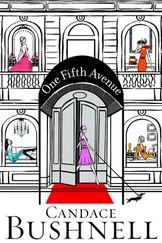They do believe in women writers (as long as the women do not become too successful or get too much attention or write about things the Diekes don't approve of—like sex—unless if s lesbian sex). James, who is secretly afraid of homosexuals (he's afraid he might be one, because he's secretly fascinated with both his and Winnie's assholes), says he is a feminist, but always puts down women who are not like Winnie (including her sister). Who are not serious. Who do not have children. Who are not married. Winnie gets physically ill at the sight of a woman she considers a slut. Or worse, a whore.
The Diekes don't know people who go to clubs or stay out late, or have sex (except Winnie's sister). People who stay up late can't, by their definition, be "serious." It takes the Diekes all day (and often well into the evenings) to get their jobs done. By then, they are so exhausted, they can only go home and eat dinner (prepared by the Jamaican nanny) and go to sleep. (Winnie has to get up at six to be with her child and go running. The child is four. Winnie hopes that the child will soon be able to run with her.) At home, they are cozy and superior, and sometimes (when they're not working) sit around in fuzzy flannel pajamas with their child. Winnie and the child wear slippers in the shape of stuffed animals, and Winnie makes their slippered, stuffed-animal feet talk to one another. The child is a sweet and happy and beautiful child who never complains. (He crawls into bed with Winnie as often as he can. He says, "Mommy, I love you.") He is learning to read. (Winnie and James know he is a genius.) "But he's a real boy," Winnie always says to her friends, who, like her, are well adjusted and earning incomes over a hundred and fifty thousand a year, who also have one or two children. It always shocks Winnie when she says this. It makes her a little afraid, because she does not like to admit that men and women are different. (If men and women are different, where does that leave her?) Winnie believes (no, knows) that she is as smart as James (even though she's not sure that he will ever admit it) and as good a journalist as he is and as good a writer. She often thinks that she is actually better than he (in every way, not just journalism), but he (being a man) has gotten more breaks. James's style of writing and her style of writing (which she picked up from James, who picked it up from other writers of his ilk) was not hard to figure out how to do, once she understood the motivation. Ditto for their conversational style: pseudo-intellectual and desperately clever at the same time—"cl-intellectual." (Tell me I'm smart—or I'll wound you.) Winnie is deeply bitter and James is deeply bitter but they never talk about it.
JAMES IS SCARED
James is scared about his work. Every time he finishes a piece, he's scared he won't get another one. When he gets another assignment (he always does, but it doesn't make any difference), he's scared he won't make the deadline. When he makes the deadline, he's scared his editor (or editors—there are always faceless editors lurking around in dark little offices at magazines) won't like the piece. When they like the piece, he's scared that it won't get published. When it does get published, he's scared that no one will read it or talk about it and all his hard work will have been for nothing. If people do talk about it (and they don't always, in which case he's scared that he's not a great journalist), he's scared that he won't be able to pull it off again.
James is scared of the Internet. (He secretly wishes it had never been invented. It scares him that it wasn't, ten years ago.) Every time he sends an e-mail (and he seems to be spending more and more time sending e-mails these days, and less time doing actual work, but isn't everybody?), he's frightened it will go to the wrong people. When the right people get it, he's frightened they'll send it to the wrong people. James knows he should send short, to the point e-mails, but something happens when he logs on. He feels angry and superior (he feels frustrated.
He knows he's smarter than most people on the Internet. He wants them to know it, and is afraid they don't). He's convinced that Internet spies are watching him. He knows his credit card number is going to be stolen. (He knows that someday, probably soon, all real books and magazines will be replaced with Internet books and magazines. He pretends, along with his friends, that this won't happen. That Internet books and magazines will only add to what already exists. He knows they will not. He knows that will probably mean that he'll be out of a job.) But most of all, James is scared of his wife. Winnie. Winnie doesn't seem to be scared of anything, and that scares him. When Winnie should be scared when she has an impossible deadline, or can't get people to cooperate on interviews, or doesn't think she's getting the assignments she wants—she gets angry. She calls people and screams. She sends e-mails. (She spends most of her time on her computer. She prides herself on her e-mails. They are pithy and clever, unlike James's, which are rambling, vicious, and too introspective. Winnie sometimes accuses him now of overwriting.) She marches into her editors' offices and has hissy fits. "I hope you're not implying that my work isn't good enough," she says threateningly. "Because I've already done a kazillion" (That’s one of her favorite words, kazillion) "pieces for you, and they were good enough. So if you don't want to give me the assignment...." She lets her voice trail off. She never says the words: "sexual discrimination.'' Everyone is just a tiny bit scared of Winnie, and James is scared that one of these days she won't get the assignment, or she'll get fired.
But she always does get the assignment. Then, at the potluck suppers ("our salon," they call it) Winnie and James host at their apartment every other Tuesday night (they invite other serious journalists and discuss the political implications of everything from cell-phone shields to celebrities with bodyguards to what’s happened to the journalists who have left real magazines and gone to the Internet—"Anybody can be a writer now. That's the problem. What’s the point of being a writer if everybody can be one?" James says), Winnie will usually bring up whatever new story she is working on. Everyone will be sitting around the living room, with Limoges plates (Winnie believes in serving guests on only the best china) on their laps, and they will be eating iceberg lettuce with fat-free salad dressing and skinless chicken breasts, and maybe some rice (none of the women in this group are good cooks or care much about food). They will drink a little bit of wine. No one they know drinks hard alcohol anymore.
And then Winnie will say something like "I want to know what everyone thinks about youth violence. I'm writing about it this week." When she started doing this a couple of years ago, James thought it was sort of cute. But now he gets annoyed (although he never shows it). Why is she always asking everyone else what they think? Doesn't she have her own thoughts? And he looks around the room to see if any of the other men (husbands) are sharing the same sentiment.
He can't tell. He can never tell. He often wants to ask these other husbands what they think of their wives. Are they scared of them too? Do they hate them? Do they ever have fantasies of pushing their wives down on the bed and ripping off their underpants and giving it to them in the butt? (James sort of tried something like that at the beginning with Winnie, but she slapped him and wouldn't talk to him for three days afterward.) Sometimes James thinks Winnie is scared that he's going to leave her. But she never says she's scared. Instead, she says something like "We've been married for seven years and have a child. I'd get half of everything, you know, if we ever got divorced. If d be awfully hard for you to live on half of what we own and only your income minus child support." (What Winnie doesn't know is that James is more afraid that she'll leave him, because she's right: It would be impossible for him to live without her income. And he wouldn't want to leave his boy.) James tries not to think about this too much, because when he does think about it, he doesn't feel like the man in the relationship. When he doesn't feel like the man, he asks himself what Winnie would ask him if she knew he were feeling that way. Specifically: What does it mean to "feel like a man,” anyway? What does "a man" feel like? And since he never can answer those questions, he has to agree with Winnie—even thinking that way is passe. Winnie told James this story on their second date: In the seventies, she smoked marijuana (age fourteen), let boys feel her up (and down) at sixteen, and lost her virginity the summer she was seventeen, to a neighborhood boy who was eighteen and very goodlooking (she'd had a crush on him for years, but he never paid any attention to her until the night he sensed she would let him have sex with her. Winnie didn't tell James that part). After he came, he drove her the half mile to her house (they did it in the basement of his parents' house, where he had a cot set up).
Читать дальше











![Кэндес Бушнелл - Есть ли еще секс в большом городе? [litres]](/books/398473/kendes-bushnell-est-li-eche-seks-v-bolshom-gorode-thumb.webp)
